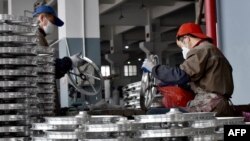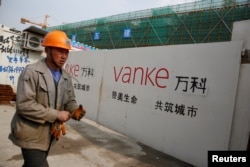As trade tensions between China and the United States worsen, a debate is intensifying in China over the purpose of private and state-owned companies.
The debate has even led to fears that the country’s communist-led government is preparing to nationalize private industries, observers say.
Under Xi Jinping’s leadership, the Chinese Communist Party has begun re-establishing its power over every part of society, including businesses.
Party on top
In June, the party announced that it was requiring that all companies listed on Chinese stock markets set up party organizations for their workers.
Over the past two weeks, tensions with the United States have increased. During that time, a number of business-related stories appeared on the internet suggesting that it was time for private companies to step aside. The stories called on China to move toward a large-scale centralized economy in which private and public companies are mixed.
In one article, financier Wu Xiaoping wrote: “The private economy has accomplished its mission to help the public economy develop and it should gradually step aside.”
These ideas received some criticism – even from Chinese state media. But the fact that the article was not immediately taken down was a sign that the government wanted to see how people would react, said Frank Xie. He is an associate professor of marketing at the University of South Carolina Aiken.
“In China, when there is something that the government doesn’t want people to hear, it won’t survive, as soon as it surfaces on the internet…it will be deleted and removed,” Xie said. “And yet this thing, the call by this guy stayed there for so long.”
Critics were also unhappy with a more recent statement. It came from Qiu Xiaoping, deputy secretary of the Ministry of Personnel and Social Affairs. Qiu said that private companies need to be more democratic. He said they also should let more people serve in management positions and help strengthen the leadership of the communist party.
Private guarantees
Chinese officials have promised that private companies would be looked after. During a visit to Liaoning province last month, President Xi urged private companies to feel secure.
Xi promised that the party would develop, support, guide and protect private industry. It is not clear if his comments meant getting more involved in the workings of private companies.
Private business leaders are deeply concerned.
They worry that China’s economy will contract, noted Lu Suiqi, an associate professor of economics at Peking University. Also, some Chinese fear the country’s leaders may sacrifice private companies to keep state-owned businesses from failing.
Lu said that even with the promises by Chinese officials, the power that state-owned businesses enjoy is unlikely to change.
State enterprises have long controlled profitable industries in China. They also have long been considered centers of corruption. State-owned enterprises have rights to 70 percent of the country’s financial resources. Yet they are responsible for about 30 percent of the national economy.
Private companies are responsible for 80 percent of all jobs in China and 60 percent of the economic growth.
Many people inside and outside of China believe state-owned enterprises are slowing China’s economic growth and are a barrier to free trade. They also are a main issue in the U.S. trade dispute with China. Yet the Chinese Communist Party is likely to continue its effort to expand the size of state-controlled businesses.
“Whether it is nationalizing private enterprises or making state-owned enterprises bigger, it is all about expanding control,” said Darson Chiu of the Taiwan Institute of Economic Research. For China’s government, Chiu said, expanding the “state operated enterprises” would make it easier to plan the economy.
That is the opposite of what U.S. President Donald Trump is asking China to do. If China moves in that direction, the trade war between the countries will continue, said Frank Xie.
“It’s only going to encourage Trump to move to the next step, with another $267 billion in tariffs,” Xie said.
Survive
But China is facing serious risks, and it is not just the trade war. The value of share prices on China’s stock market is at its lowest level in nearly four years. And, industrial growth has slowed in each of the past four months.
Recently, the head of China’s biggest real estate business Vanke made news when he announced that the company’s main goal is to “survive.”
Speaking at a private meeting, Vanke Chairman Yu Liang said China is currently at a turning point and no industry will be safe from unwelcome economic actions.
I'm Mario Ritter.
Bill Ide reported this story for VOANews.com. George Grow adapted his report for Learning English. Mario Ritter was the editor.
_________________________________________________________________
Words in This Story
scale – n. a set amount or numbers used to measure something
accomplish – v. to carry out or complete successfully
mission – n. an important job or project
guy – n. man
gradually – adv. moving or changing in small amounts; happening in a slow way over time
management – n. the act of controlling people or things
contract – v. an agreement meant to be enforceable by law
encourage – v. to give support or advice to
tariff – n. a tax on imports or exports
real estate – n. property in buildings and land
We want to hear from you. Write to us in the Comments Section.







